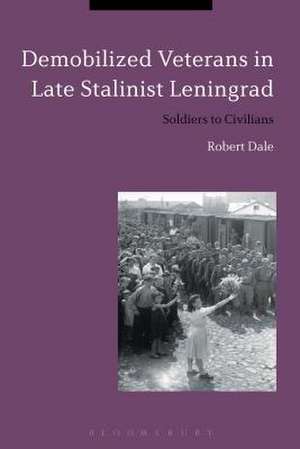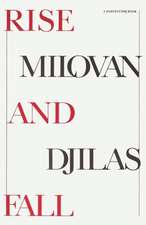Demobilized Veterans in Late Stalinist Leningrad: Soldiers to Civilians
Autor Dr Robert Daleen Limba Engleză Hardback – 21 oct 2015
| Toate formatele și edițiile | Preț | Express |
|---|---|---|
| Paperback (1) | 258.24 lei 6-8 săpt. | |
| Bloomsbury Publishing – 19 apr 2017 | 258.24 lei 6-8 săpt. | |
| Hardback (1) | 774.62 lei 6-8 săpt. | |
| Bloomsbury Publishing – 21 oct 2015 | 774.62 lei 6-8 săpt. |
Preț: 774.62 lei
Preț vechi: 1113.41 lei
-30% Nou
Puncte Express: 1162
Preț estimativ în valută:
148.24€ • 160.97$ • 124.52£
148.24€ • 160.97$ • 124.52£
Carte tipărită la comandă
Livrare economică 22 aprilie-06 mai
Preluare comenzi: 021 569.72.76
Specificații
ISBN-13: 9781472590770
ISBN-10: 1472590775
Pagini: 288
Ilustrații: 10 bw illus
Dimensiuni: 156 x 234 x 20 mm
Greutate: 0.57 kg
Editura: Bloomsbury Publishing
Colecția Bloomsbury Academic
Locul publicării:London, United Kingdom
ISBN-10: 1472590775
Pagini: 288
Ilustrații: 10 bw illus
Dimensiuni: 156 x 234 x 20 mm
Greutate: 0.57 kg
Editura: Bloomsbury Publishing
Colecția Bloomsbury Academic
Locul publicării:London, United Kingdom
Caracteristici
An original case study of the complex transition of withdrawn Soviet soldiers from war to peace in Leningrad
Notă biografică
Robert Dale is Lecturer in Russian History at Newcastle University, UK.
Cuprins
Introduction1. The Troops Come Home2. 'Homes for Heroes': Veterans and the Postwar Housing Crisis3. 'As in battle - as in labour': The Remobilization of Demobilized Veterans4. Healing the Wounds: Health, Disability and Trauma5. Disorderly Demobilization: Crime, Violence and Social Disorder6. Demobilizing the Mind: Veterans, Politics and MemoryConclusionGlossaryBibliographyIndex
Recenzii
One of the great virtues of this book is its comparative angle. Dale has read widely in the international history of veterans, and often comments on how the Soviet experience fits into wider transnational patterns. The other virtue is Dale's unwillingness to write in one of the mushrooming sub-genres. Instead he combines social and cultural history, memory studies, and the history of medicine . [A]nybody interested in the history of warfare and welfare in the twentieth century will benefit from reading this book.
Dale's scrutiny of the issue of demobilization has a remarkable freshness. Although the arguments he advances in Demobilized Veterans in Late Stalinist Leningrad will be familiar to most scholars of the Soviet Union, the book is original in its ability to illuminate Soviet soldiers' embodied and intimate experience of homecoming. Dale masterfully brings to life individual experiences and expertly connects them to the larger tensions, conflicts and visions of model citizenship in late Stalinist society ... [This] is useful reading for any scholar interested in the comparative history of post-war transition.
. [T]he research is excellent, and Dale competently uses local details and stories to illustrate this larger picture.
As someone who has studied the Blockade of Leningrad and the Soviet experience of World War II for a decade, I welcome this kind of book, because "what happened next?" is quite important for Russian/Soviet area studies and beyond. His data and narrative help fill in the picture, and scholars should have Dale's contribution in their libraries or on their shelves as a good reference source, and his book or its chapters individually could serve as material for undergraduate courses on Russian history.
Robert Dale's book is a valuable addition to the re-examination of Soviet demobilization after WWII and its broader importance to Soviet society's difficult and, perhaps, unfinished "transition" from war to peace . Dale successfully interrogates a central claim of Soviet post-war propaganda, long accepted by many historians, that veterans enjoyed significant upward mobility in employment, to reveal that for many veterans the quality and speed of this employment and, generally, of the mobility itself was low and debilitatingly slow. Dale thus looks behind the impressive statistics of veteran employment used as proof of their successful reintegration to question this criterion of "success" and, importantly, tell a human story in a closed society beyond the numbers.
One of the great virtues of this book is its comparative angle ... The other virtue is Dale's unwillingness to write in one of the mushrooming sub-genres ... Anybody interested in the history of warfare and welfare in the twentieth century will benefit from reading this book.
A precise, wide-ranging and formidably detailed study ... [Drawing] on a very thorough engagement with archives in Moscow, St Petersburg and Vyborg, an illuminating selection of published material, a small number of oral history interviews, a mastery of the secondary literature and an imaginative field of comparisons ... [Dale] writes with great imagination and skill.
A very necessary and welcome addition to the available literature on the subject.
A valuable resource for Soviet social and cultural historians of the postwar period, as well as an example of effective case study work for Russian history graduate students. Thanks to consistent international comparisons, the text can serve as a valuable survey for non-Soviet scholars studying the demobilization of veterans through political, sociological, or legal frameworks.
Interesting and accessible. Robert Dale calmly leads us through the arguments and uses personal stories to illuminate them effectively.The Great Patriotic War did not end in 1945 -- at least not for the demobilized veterans. Soviet society had been torn apart. Turning soldiers back into civilians proved a formidable task. Robert Dale takes us through the painful process of reintegration, focussing on the extraordinary experiences of Leningraders. There could be no happy ending but, for surprising reasons, Dale also shows us how disaster was kept at bay.
Dale's case study of Leningrad's and Leningraders' experience of demobilization after World War II serves as a case study of the larger experience of Soviet demobilization, but with atypical, site-specific exceptions. Using not only local and national archives and newspapers, but also incorporating memoirs and first-hand oral testimony, Dale shows how local factors played an important part in shaping soldiers' postwar transitions. This is an important study of late Stalinism, which reveals a protracted period of social transition, pervaded throughout with the tensions, divisions and conflicts created by veterans' demobilization. The author makes useful comparisons between late Stalinist Leningrad and Britain, America, and Germany after both the First and Second World Wars, which gives a global context to Soviet demobilization and the veterans' quest to reintegrate into "normal" Soviet society.
Focusing on returning soldiers' postwar struggles to obtain adequate housing, necessary medical care, and rewarding work in a city that was itself ravaged by war, Demobilized Veterans in Late Stalinist Leningrad offers a fascinating picture of individuals and Soviet society in transition from war to peace. In Leningrad, where veterans had to compete with survivors of the blockade for scarce resources, the homecoming rarely resembled the official "myth" of returning heroes embraced by grateful civilians. Yet Dale's study emphasizes the veterans' remarkably successful reintegration into civilian life. Although soldiers returning to Leningrad faced exceptional material hardships, the city offered an important emotional advantage: Veterans joined a community of civilian survivors who understood the horrors of modern warfare.
Dale's scrutiny of the issue of demobilization has a remarkable freshness. Although the arguments he advances in Demobilized Veterans in Late Stalinist Leningrad will be familiar to most scholars of the Soviet Union, the book is original in its ability to illuminate Soviet soldiers' embodied and intimate experience of homecoming. Dale masterfully brings to life individual experiences and expertly connects them to the larger tensions, conflicts and visions of model citizenship in late Stalinist society ... [This] is useful reading for any scholar interested in the comparative history of post-war transition.
. [T]he research is excellent, and Dale competently uses local details and stories to illustrate this larger picture.
As someone who has studied the Blockade of Leningrad and the Soviet experience of World War II for a decade, I welcome this kind of book, because "what happened next?" is quite important for Russian/Soviet area studies and beyond. His data and narrative help fill in the picture, and scholars should have Dale's contribution in their libraries or on their shelves as a good reference source, and his book or its chapters individually could serve as material for undergraduate courses on Russian history.
Robert Dale's book is a valuable addition to the re-examination of Soviet demobilization after WWII and its broader importance to Soviet society's difficult and, perhaps, unfinished "transition" from war to peace . Dale successfully interrogates a central claim of Soviet post-war propaganda, long accepted by many historians, that veterans enjoyed significant upward mobility in employment, to reveal that for many veterans the quality and speed of this employment and, generally, of the mobility itself was low and debilitatingly slow. Dale thus looks behind the impressive statistics of veteran employment used as proof of their successful reintegration to question this criterion of "success" and, importantly, tell a human story in a closed society beyond the numbers.
One of the great virtues of this book is its comparative angle ... The other virtue is Dale's unwillingness to write in one of the mushrooming sub-genres ... Anybody interested in the history of warfare and welfare in the twentieth century will benefit from reading this book.
A precise, wide-ranging and formidably detailed study ... [Drawing] on a very thorough engagement with archives in Moscow, St Petersburg and Vyborg, an illuminating selection of published material, a small number of oral history interviews, a mastery of the secondary literature and an imaginative field of comparisons ... [Dale] writes with great imagination and skill.
A very necessary and welcome addition to the available literature on the subject.
A valuable resource for Soviet social and cultural historians of the postwar period, as well as an example of effective case study work for Russian history graduate students. Thanks to consistent international comparisons, the text can serve as a valuable survey for non-Soviet scholars studying the demobilization of veterans through political, sociological, or legal frameworks.
Interesting and accessible. Robert Dale calmly leads us through the arguments and uses personal stories to illuminate them effectively.The Great Patriotic War did not end in 1945 -- at least not for the demobilized veterans. Soviet society had been torn apart. Turning soldiers back into civilians proved a formidable task. Robert Dale takes us through the painful process of reintegration, focussing on the extraordinary experiences of Leningraders. There could be no happy ending but, for surprising reasons, Dale also shows us how disaster was kept at bay.
Dale's case study of Leningrad's and Leningraders' experience of demobilization after World War II serves as a case study of the larger experience of Soviet demobilization, but with atypical, site-specific exceptions. Using not only local and national archives and newspapers, but also incorporating memoirs and first-hand oral testimony, Dale shows how local factors played an important part in shaping soldiers' postwar transitions. This is an important study of late Stalinism, which reveals a protracted period of social transition, pervaded throughout with the tensions, divisions and conflicts created by veterans' demobilization. The author makes useful comparisons between late Stalinist Leningrad and Britain, America, and Germany after both the First and Second World Wars, which gives a global context to Soviet demobilization and the veterans' quest to reintegrate into "normal" Soviet society.
Focusing on returning soldiers' postwar struggles to obtain adequate housing, necessary medical care, and rewarding work in a city that was itself ravaged by war, Demobilized Veterans in Late Stalinist Leningrad offers a fascinating picture of individuals and Soviet society in transition from war to peace. In Leningrad, where veterans had to compete with survivors of the blockade for scarce resources, the homecoming rarely resembled the official "myth" of returning heroes embraced by grateful civilians. Yet Dale's study emphasizes the veterans' remarkably successful reintegration into civilian life. Although soldiers returning to Leningrad faced exceptional material hardships, the city offered an important emotional advantage: Veterans joined a community of civilian survivors who understood the horrors of modern warfare.


















